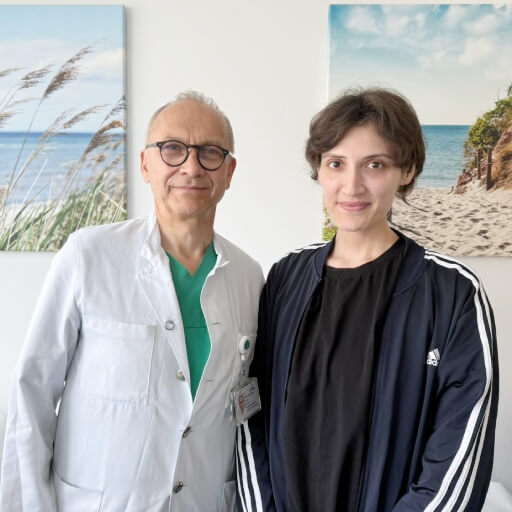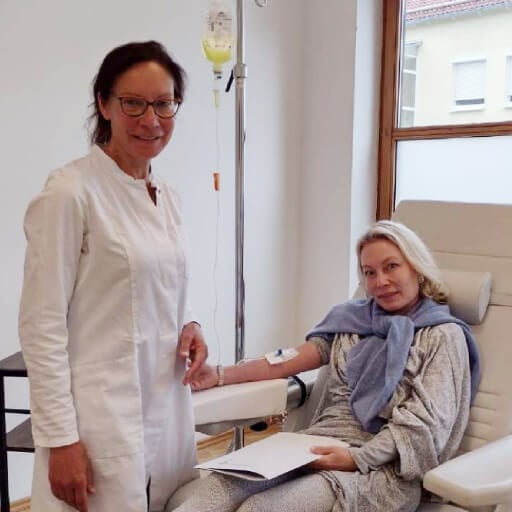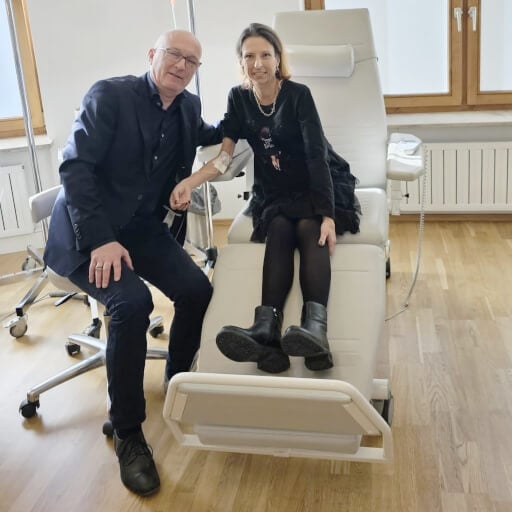Гипертермическая внутрибрюшинная химиотерапия (HIPEC) – это таргетный метод лечения рака, который применяется при распространении опухолей в пределах брюшной полости. В отличие от стандартной химиотерапии, при HIPEC нагретая высокая доза лекарственных препаратов доставляется непосредственно в брюшную полость после хирургического удаления опухоли, что обеспечивает их более эффективное локальное действие с меньшим количеством системных побочных эффектов.
Терапия HIPEC стала важным методом лечения поздних стадий колоректального рака, а также рака яичников, желудка и аппендикса с поражением брюшины. Результаты клинических исследований, в том числе данные опубликованные в журнале The Lancet Oncology и представленные Американским обществом клинической онкологии (ASCO), показали, что проведение HIPEC в сочетании с хирургическим вмешательством значительно улучшает результаты лечения у пациентов, прошедших строгий отбор на процедуру [1].
Кому может быть показано лечение методом HIPEC и почему оно может изменить прогноз
К сожалению, HIPEC подходит не всем пациентам. Данный метод лечения рака предназначен для тех случаев, когда онкопроцесс распространяется по серозной оболочке брюшины, но при этом остается локализованным в пределах этой анатомической области. При надлежащем применении терапевтического подхода у пациента есть шанс победить рак, особенно если речь идет об онкопатологиях, которые ранее считались неизлечимыми.
Роль HIPEC в лечении рака органов брюшной полости
Гипертермическая внутрибрюшинная химиотерапия – это не стандартный метод лечения, а специализированная процедура, которая была разработанная для пациентов с раком, распространившимся в пределах брюшной полости. В отличие от традиционной химиотерапии, HIPEC представляет собой метод локального действия, направленный на поражение анатомической области с наиболее агрессивным проявлением заболевания. Однако настоящая ценность этой процедуры заключается не столько в ее локальном воздействии, сколько в ее высокой эффективности.
Данный подход является частью тщательно продуманной тактики лечения. Как правило, HIPEC применяется в тех случаях, когда по результатам визуализационной диагностики и других исследований констатируется ограниченность онкопроцесса брюшиной. Речь идет не о замене системной терапии, а о таргетном воздействии на те анатомические области, где стандартная химиотерапия зачастую оказывается неэффективной.
Кому может помочь процедура HIPEC
Процедура HIPEC в основном применяется в тех случаях, когда рак распространился на поверхность органов брюшной полости, но пока не проник глубоко в ткани. Возможность ее проведения часто рассматривается при:
- Раке желудка IV стадии с распространением по брюшине
- Колоректальном раке поздних стадий, включая рак толстой, прямой и сигмовидной кишки
- Прогрессирующем раке тонкого кишечника или двенадцатиперстной кишки
- Опухолях аппендикса, особенно с поражением слизистой оболочки органа
- Канцероматозе брюшины, вызванном раком эндометрия или шейки матки IV стадии
- Поздних стадиях эпителиальных опухолей яичников и других гинекологических новообразований с диссеминацией в брюшине
- Редких заболеваниях брюшины, например, псевдомиксоме брюшины и мезотелиоме брюшины
Клинический случай каждого пациента рассматривается в индивидуальном порядке. Основными определяющими факторами для оценки целесообразности проведения HIPEC являются биология опухоли, степень распространения онкопроцесса и общее состояние здоровья пациента.
Уникальность HIPEC: ключевые отличительные особенности
Три основные причины, отличающие HIPEC от других методов лечения рака:
- Локализованная химиотерапия: HIPEC позволяет значительно повысить концентрацию химиотерапевтических препаратов непосредственно в опухолевом очаге, снижая системную токсичность.
- Повышение эффективности терапии за счет нагревания препаратов: гипертермия улучшает абсорбцию лекарств и напрямую повреждает раковые клетки, особенно те, которые резистентны к традиционной химиотерапии.
- Применение в синергии с хирургией: HIPEC проводится сразу после удаления опухоли, воздействуя на остаточные микроскопические очаги заболевания до того, как сформируется рубцовая ткань или опухоли смогут распространиться дальше.
HIPEC – это не панацея, но если речь идет о лечении для пациентов с определенными типами опухолей и распространением онкопроцесса в пределах брюшины, то этот метод способен кардинально изменить прогноз и продлить онкобольному жизнь.
Как работает HIPEC: сочетание хирургии с теплотерапией для борьбы с раком брюшины
Гипертермическая внутрибрюшинная химиотерапия (HIPEC) – это не самостоятельный метод лечения, а часть двухэтапной лечебной процедуры, целью которой является удаление видимых опухолей и уничтожение микроскопических раковых клеток, оставшихся в брюшной полости после операции. Комбинация циторедуктивной хирургии (ЦРХ) с последующим введением в брюшную полость горячего раствора химиопрепаратов стала основным методом лечения для отдельных групп пациентов с поздними стадиями канцероматоза брюшины.
Первый этап – циторедуктивная хирургия (ЦРХ)
Терапевтический процесс начинается в операционной: пациенту проводят циторедукцию – сложную и зачастую обширную операцию, включающую удаление всех видимых опухолей с поверхности брюшины. В зависимости от степени распространения заболевания, вмешательство может включать частичное или полное удаление пораженных органов, таких как толстая кишка, яичники, матка, аппендикс, сальник или участки тонкой кишки.
Целью ЦРХ является достижение полной или почти полной циторедукции, которую зачастую обозначают «CCR-0» или «CCR-1». Такое значение свидетельствует о том, что видимых следов опухоли вовсе не осталось или остались только узелки размером менее 2,5 мм, которые достаточно малы для их эффективного уничтожения на последующем этапе HIPEC.
Достижение полной циторедукции имеет решающее значение для обеспечения пациенту хорошего результата лечения. Данные исследований неизменно демонстрируют, что успех терапии HIPEC непосредственно связан с объемом опухолевой массы, удаленной в ходе хирургического вмешательства.
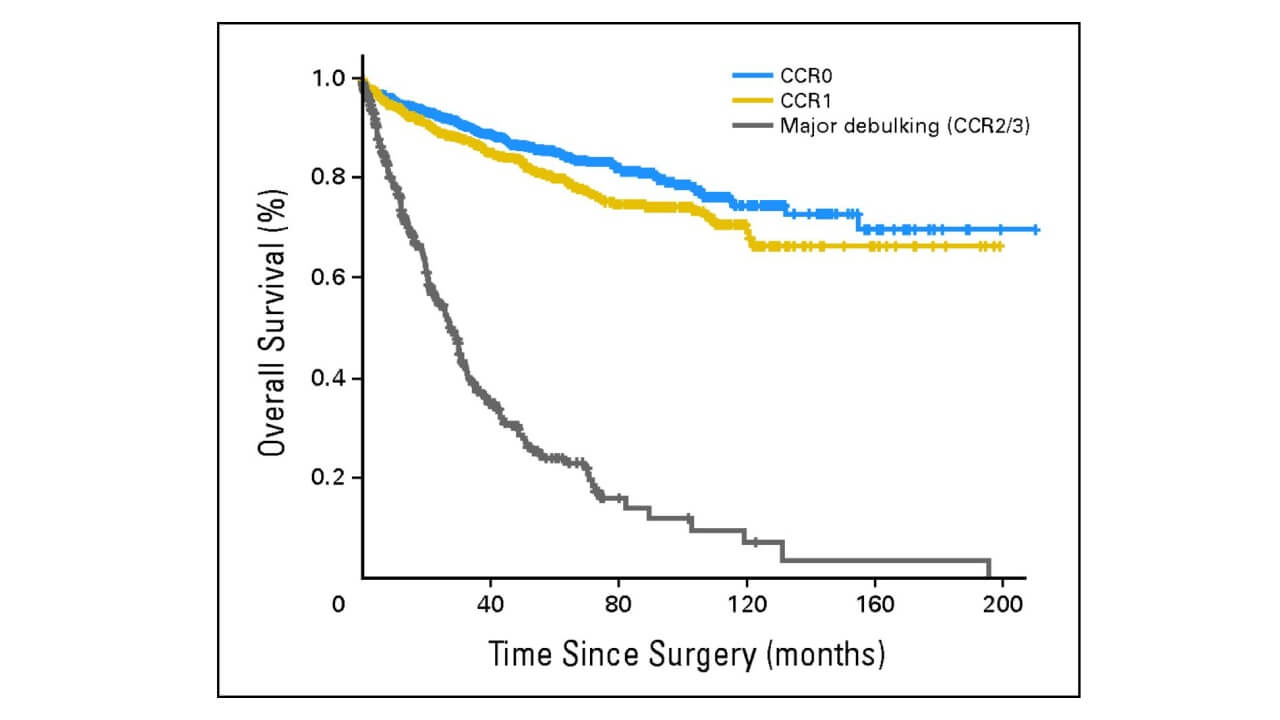
Второй этап – гипертермическая химиотерапия (HIPEC)
После завершения циторедукции хирургическая бригада переходит непосредственно к фазе HIPEC. В брюшину вводится стерильный раствор с химиотерапевтическим препаратом, который нагревается примерно до 41-43°C (105,8-109,4°F) и циркулирует по всех ее анатомических структурах.
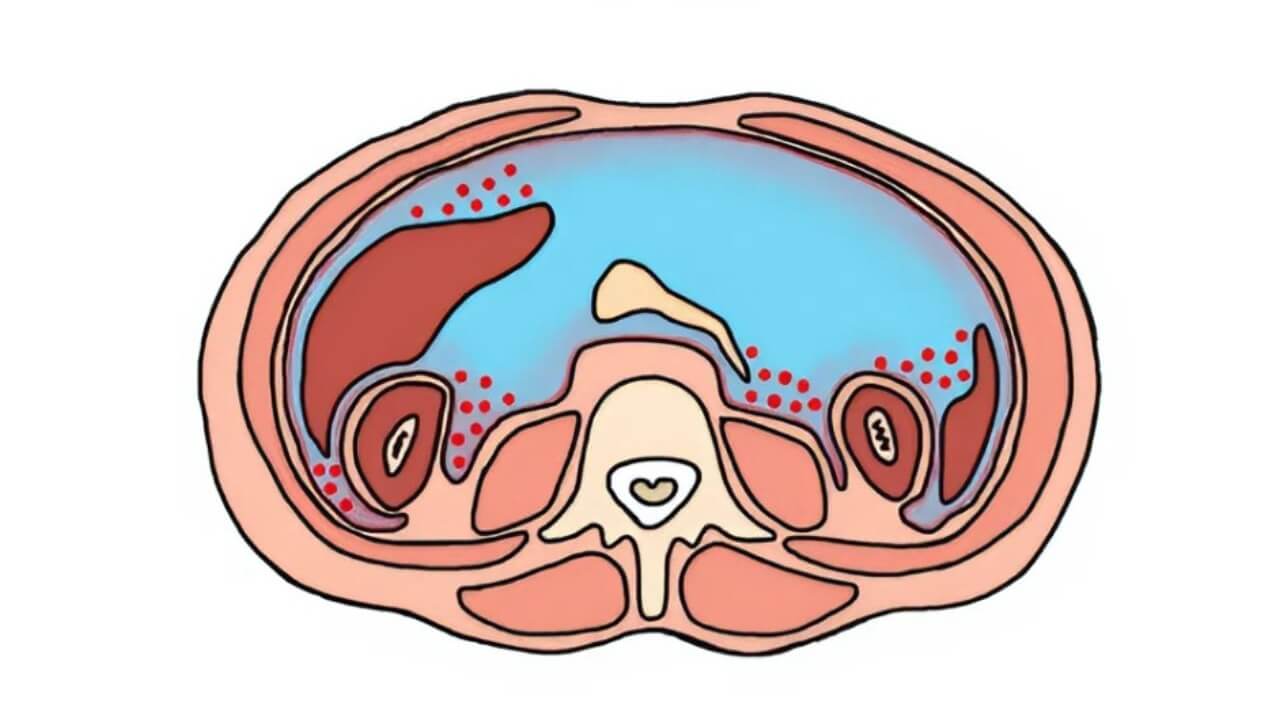
В течение 60-90 минут внутренние органы «промывают» горячим раствором химиопрепаратов, за счет чего обеспечивается их прямой контакт с остаточными микроскопическими раковыми клетками, которые невозможно удалить хирургическим путем. Нагревание лекарственных средств не только улучшает их проникновение в раковые клетки, но и усиливает их цитотоксический эффект, тогда как здоровые ткани демонстрируют более высокую резистентность к такому тепловому воздействию.
| Температура | Тип гипертермии | Цитотоксический эффект | Термосенсибилизация | Влияние на сосуды | Иммунная реакция |
|---|---|---|---|---|---|
| 39–41 °C | Легкая | Минимальная остановка роста опухолей | Синергизм с цитотоксическими препаратами | Усиление кровотока | Усиленная |
| 41–43 °C | Умеренная | Обратимая остановка роста опухолей | Значительное усиление эффекта при применении в комплексе с цитотоксическими препаратами | Усиление кровотока | Усиленная |
| >43 °C | Сильная | Экспоненциальная остановка роста опухолей, значительное цитотоксическое воздействие на нормальные клетки | Значительное усиление эффекта при применении в комплексе с цитотоксическими препаратами | Снижение кровотока | Подавленная |
*Вариации в клиническом применении гипертермической внутрибрюшинной химиотерапии: обзор [4]
HIPEC проводится с помощью закрытой или открытой техники – в зависимости от применяемого в хирургическом центре протокола. При использовании «закрытой» техники брюшная полость временно герметизируется, а раствор химиопрепаратов подается и циркулирует через катетеры. При «открытой» технике (также ее называют «техникой Колизея») брюшная полость вскрывается и хирурги вручную «перемешивают» раствор химиопрепаратов под прямым визуальным контролем.
Важность применения двух методов в тандеме
Сильная сторона хирургии и HIPEC заключается в синергии этих двух методик: в ходе хирургии удаляется основная часть опухолевой массы, в то время как терапия HIPEC воздействует на микроскопические раковые клетки, которые часто приводят к развитию рецидива, если не провести соответствующее лечение.
При традиционном внутривенном введении химиопрепараты зачастую с трудом проникают через брюшину из-за перитонеально-плазматического барьера. HIPEC преодолевает это препятствие, доставляя их непосредственно в брюшную полость, благодаря чему достигаются гораздо более высокие локальные концентрации химиопрепаратов и обеспечивается меньшее количество системных побочных эффектов.
Само по себе компонент гипертермии в процессе лечения продемонстрировал биологическую активность: он способствует более эффективному повреждению ДНК в раковых клетках, нарушению механизмов репарации и увеличению проницаемости клеточных мембран, тем самым повышая эффективность применяемых химиопрепаратов.
Данная тактика комбинированного лечения показала особенно многообещающие результаты в области гинекологической онкологии. В ходе крупного рандомизированного клинического исследования, результаты которого опубликованы в журнале The New England Journal of Medicine [5], ван Дрил и его коллеги продемонстрировали, что проведение HIPEC в дополнение к интервальной циторедуктивной хирургии помогло значительно улучшить показатели безрецидивной и общей выживаемости у пациенток с эпителиальным раком яичников III стадии.
Исследование показало, что у женщин, получавших лечение методом HIPEC, средний показатель безрецидивной выживаемости составил 14,2 месяца по сравнению с 10,7 месяцами в группе онкобольных, прошедших только хирургию, при этом количество серьезных побочных эффектов не увеличилось.
Где можно пройти эффективное лечение методом HIPEC
Германия стала одной из самых авторитетных стран в сфере лечения рака с помощью HIPEC, поэтому привлекает международных пациентов в поиске передовых решений в области хирургии карциноматоза брюшины. Благодаря развитой медицинской инфраструктуре, передовой системе здравоохранения, инновационным технологиям и одним из лучших в Европе больниц, специализирующихся на терапии HIPEC, Германия имеет неоспоримое преимущество в лечении карциноматоза брюшины, в том числе рака яичников, толстой кишки, желудка и аппендикса IV стадии.
Почему пациенты выбирают лечение HIPEC в Германии
Одним из ключевых преимуществ проведения CRS + HIPEC в Германии является плотная интеграция хирургии и медицины. В госпиталях Германии такое лечение проводится с использованием высокоточных аппаратов перфузии с встроенной системой контроля температуры, часто под контролем роботизированной хирургической аппаратуры. Хирурги работают в тесной кооперации с консилиумами онкологов, которые определяют оптимальный курс лечения для каждого пациента на любой стадии онкологического заболевания.
В немецких больницах специалисты соблюдают строгие клинические протоколы, соответствующие как национальным, так и европейским рекомендациям в области онкологии. Благодаря этому пациенты получают не только технически безупречное лечение рака с помощью HIPEC, но и комплексный послеоперационный уход, быструю диагностику и структурированное планирование последующего наблюдения.
Профессор Михаэль Липп о преимуществах HIPEC
Преимущества и риски HIPEC
Внедрение в клиническую практику гипертермической интраперитонеальной химиотерапии (HIPEC) способствовало изменннию подхода многих больниц к лечению карциноматоза брюшины на поздних стадиях. Благодаря комбинации таргетной химиотерапии и хирургии в рамках одной лечебной процедуры, данный подход обеспечивает целенаправленное и высокоперсонализированное лечение, которое помогло тысячам пациентов восстановить контроль над своим здоровьем.
Одним из главных преимуществ метода HIPEC является его высокая совместимость с современными техниками в хирургии. После удаления опухоли нагретый раствор химиопрепаратов медленно циркулирует по всей брюшной полости, благодаря чему лекарства напрямую воздействуют на микроскопические раковые клетки, не оказывая негативного влияния на остальные участки тела. Пациенты обычно испытывают меньше системных побочных эффектов по сравнению со стандартной химиотерапией, так как препараты вводятся локально. При проведении процедуры опытными специалистами в госпиталях, специализирующихся на хирургии, такое лечение способно не только существенно продлить пациенту жизнь, но и улучшение ее качество.
Потенциальные риски и осложнения
Как и любой передовой метод лечения, процедура HIPEC сопряжена с определенными рисками. Это обширное хирургическое вмешательство, требующей тщательного планирования, привлечения квалифицированной многопрофильной команды специалистов и продуманной программы восстановления пациента. Временные осложнения могут включать замедленное восстановление функции кишечника, повышенную утомляемость или нарушения заживления ран. Однако в онкологических центрах с богатым опытом в сфере проведения HIPEC для рака брюшной полости об этих осложнениях хорошо осведомлены, а также здесь наработан оптимальный алгоритм действий для их надлежащего устранения.
Восстановление и последующее наблюдение
Процесс восстановления занимает некоторое время, но многие пациенты возвращаются к привычной повседневной жизни уже через несколько месяцев. Больницы, специализирующиеся на HIPEC, предоставляют комплексную медицинскую поддержку до, во время и после лечения, включая рекомендации по питанию, реабилитационные услуги и тщательное послеоперационное наблюдение.
HIPEC для рака брюшной полости представляет собой многообещающий шаг вперед в современной медицине. Это сложное, но в то же время пациент-ориентированное лечение, которое действительно обеспечивает эффективные результаты, а также обладает высокой точностью и благоприятным профилем безопасности.
История Татьяны о победе над раком брюшины с помощью HIPEC в Германии
В 2022 году у Татьяны Петерсон из Норвегии диагностировали перитонеальный карциноматоз, развитие которого спровоцировал рак яичников. Она прошла курс химиотерапии и хирургию. После лечения у пациентки наступила ремиссия, которая продлилась всего два года. Но на этом череда неприятных событий не закончилась – у Татьяны выявили крупную опухоль печени, которая локализовалась в непосредственной близости от воротной вены, что существенно затрудняло ее лечение. Из-за сложной локализации новообразования врачи на родине пациентки сочли операцию слишком рискованной и прогнозировали ей не более шести месяцев жизни, даже при условии проведения химиотерапии.
Татьяна начала искать варианты лечения в Германии, которая славится своим первоклассным качеством лечения в области онкологии. Однако самостоятельно разобраться в системе здравоохранения этой страны оказалось совсем непросто, к тому же процесс отнимал много времени, которого, к сожалению, нет ни у одного онкобольного. Именно в тот трудный жизненный период Татьяна наткнулась на сайт компании Booking Health.
За короткий промежуток времени команда Booking Health помогла ей найти подходящую больницу и организовала прием на сложную операцию, которая длилась семь часов. Несмотря на серьезность вмешательства, у Татьяны остались лишь приятные воспоминания: «Я ожидала, что восстановление будет сложным, но оно оказалось довольно комфортным». После HIPEC я была максимально спокойной. Татьяна оценила организацию лечения: «После терапии HIPEC я не испытывала дискомфорта – весь процесс был тщательно продуман и хорошо организован».
Вспоминая о своем опыте сотрудничества с Booking Health, она говорит: «Они действительно проделали качественную работу, благодаря которой мне удалось сэкономить много времени. Я чувствовала поддержку все время, каждый день».
На сегодняшний день Татьяне не просто удалось сохранить себе жизнь, но и вернуть ее достойное качество. Она радуется каждому дню и смотрит в будущее с оптимизмом. Ее история – это убедительное напоминание о том, каких успешных результатов можно достичь при сочетании профессиональной медицинской помощи со своевременной координационной поддержкой.
Полная версия истории Татьяны представлена в этом видео:
Стоимость лечения методом HIPEC в Германии
При рассмотрении варианта лечения HIPEC в Германии пациенты могут рассчитывать на прозрачную и комплексную стоимость терапии, охватывающую все основные аспекты медицинского обслуживания. В стоимость HIPEC в Германии включен весь необходимый комплекс услуг, благодаря чему пациентам обеспечивается масса преимуществ:
- Фиксированные цены на лечение без скрытых платежей, гарантирующие финансовую прозрачность с первого этапа терапевтического процесса.
- Начало организации лечения в течение 48 часов после получения запроса пациента, что помогает сократить время ожидания и ускорить доступ к медицинской помощи.
- Более 12 лет опыта работы в сфере медицинского туризма и предоставлении профессиональных координационных услуг на протяжении всего процесса.
- Оценка кейса пациента специализированным консилиумом врачей с обеспечением составления для него персонализированной программы лечения.
- Услуги персонального координатора 24/7, который оказывает пациентам необходимую помощь и поддержку на их родном языке.
- Визовая поддержка, а также помощь в бронировании авиабилетов, номера в отеле или аппартаментов для проживания на период лечения в другой стране и трансфера, благодаря чему поездка за рубеж будет максимально комфортной для пациента.
- Перевод медицинских заключений и подготовка всех необходимых документов для обеспечения беспрепятственного приема в госпиталь за рубежом.
- Доступ к предлагаемым в Германии инновационным методам лечения, благодаря чему пациентам предоставляется возможность воспользоваться новейшими достижениям в области передовой онкологии.
- Договора с ведущими больницами с фиксированной стоимостью медицинских услуг, благодаря которым пациенты получают защиту от непредвиденных дополнительных расходов.
За профессиональную координацию представленного комплекса услуг отвечает Booking Health – международный оператор медицинского туризма с надежной репутацией. Сотрудники компании оказывают всестороннюю поддержку пациентам на протяжении всего процесса лечения – начиная с первой консультации до успешного восстановления больного. Такой пациент-ориентированный подход компании к обслуживанию не только гарантирует высокое качество медицинского сервиса, но и избавляет от ненужного беспокойства, ведь специалисты Booking Health берут на себя решение всех логистических и административных вопросов. Благодаря услугам компании иностранным пациентам предоставляется беспрепятственный доступ к лечению HIPEC в Германии с обеспечением комплексной поддержки на каждом этапе процесса.
| Страна | Стоимость |
|---|---|
| Германия | €55,000 – €75,000 |
| Великобритания | €83,000 – €118,000 |
| США | €112,000 – €150,000 |
*На основе клинических данных Booking Health
Поездка на лечение за границу с Booking Health
Самостоятельный поиск наилучшей тактики лечения с учетом вашей индивидуальной клинической ситуации – довольно сложная задача. Испытав на себе многочисленные курсы лечения, проконсультировавшись со множеством специалистов и испробовав различные терапевтические процедуры, вам может быть трудно сориентироваться во всей предоставленной врачами информации. В таком случае пациенты зачастую выбирают первый же предложенный вариант лечения или соглашаются на лечение с применением стандартизированных терапевтических протоколов, которое повлечет за собой множество побочных эффектов, вместо того, чтобы рассмотреть возможность терапии с помощью инновационных процедур.
Если вы хотите сделать осознанный выбор и получить лечение рака в соответствии с индивидуально разработанной для вас схемой с учетом особенностей вашей конкретной клинической ситуации, проконсультируйтесь с врачами-консультантами Booking Health. Компания Booking Health уже более 12 лет занимает ведущие позиции в сфере организации лечения за рубежом с применением новейших инноваций в медицине, поэтому ее специалисты обладают огромным опытом в составлении персонализированных комплексных программ лечения для каждого пациента. Booking Health пользуется репутацией авторитетной компании, которая предоставляет персонализированный подбор схемы лечения рака и клиники с прямым бронированием приема в медицинском центре и полной поддержкой на каждом этапе лечения – от решения организационных вопросов до помощи в процессе лечения. Мы предлагаем:
- Оценку и анализ медицинских заключений пациента
- Составление индивидуальной программы лечения
- Подбор подходящего медицинского учреждения для лечения
- Подготовку медицинской документации и ее направление в выбранную пациентом для лечения клинику
- Консультации с врачами зарубежной клиники для разработки оптимальной медицинской программы на этапе подготовки к поездке на лечение
- Экспертные консультации во время пребывания в больнице
- Последующее консультирование пациента после его возвращения домой по завершении медицинской программы
- Решение организационных вопросов в рамках подготовки к поездке на лечение за границу
- Координацию пребывания пациента в другой стране, помощь в бронировании отеля или апартаментов на период лечения
- Помощь в оформлении визы и бронировании авиабилетов
- Услуги переводчика и персонального координатора, который будет с вами на связи 24/7
- Прозрачные цены на лечение без скрытых платежей
Здоровье – главная ценность в жизни каждого человека, доверять заботу о которой стоит лишь лучшим специалистам с богатым опытом и проверенной репутацией. Booking Health – это ваш надежный партнер, который оказывает всестороннюю помощь на пути к восстановлению здоровья и улучшению качества жизни. Свяжитесь с врачом-консультантом компании, чтобы узнать больше о возможностях персонализированного лечения рака у ведущих экспертов с использованием инновационных методов.
Лечение рака за рубежом: опыт пациентов Booking Health
Частые вопросы о процедуре HIPEC
Отправить запрос на лечениеHIPEC – это гипертермическая внутрибрюшинная химиотерапия. Суть процедуры состоит в следующем: сразу после операции горячий раствор химиопрепаратов вводится непосредственно в брюшную полость. При таком подходе у врачей есть возможность более таргетно воздействовать на раковые клетки путем применения высококонцентрированных доз лекарственных средств при минимизации их негативного воздействия на остальные части тела.
HIPEC в основном применяется для лечения рака органов брюшной полости. Особую ценность метод имеет для пациентов с перитонеальным карциноматозом. Наиболее распространенные показания включают применение HIPEC при колоректальном раке, раке яичников и раке аппендикса. Лечение рака с помощью HIPEC также применяется при других опухолях, распространяющихся на брюшину.
Да, лечение рака яичников HIPEC признано эффективным методом в онкологии, особенно если речь идет о поздних стадиях заболевания. После проведения циторедуктивной хирургии, целью которой является удаление видимых опухолей, для уничтожения микроскопических раковых клеток проводится процедура HIPEC, предполагающая «промывание» брюшины горячим раствором химиопрепаратов. Данный терапевтический подход помогает улучшить показатели выживаемости пациентов при условии надлежащего соблюдения критериев отбора больных на лечение.
HIPEC является частью процедуры, в ходе которой внутрибрюшинная химиотерапия проводится в комплексе с циторедуктивной хирургией (CRS + HIPEC). Сначала проводится циторедуктивная операция, направленная на удаление максимального объема видимой опухолевой массы. Затем для уничтожения оставшихся раковых клеток в брюшную полость интраоперационно вводят химиопрепараты, которые циркулируют там в течение 60-90 минут. При подобном введении раствора химиопрепаратов непосредственно в брюшную полость обеспечивается их более высокая локальная эффективность.
Как и любая обширная операция, гипертермическая внутрибрюшинная химиотерапия (HIPEC) сопряжена с определенными рисками. Осложнения HIPEC могут включать инфекционные поражения, кровотечения или повреждение органов, но при проведении процедуры в лучших больницах по HIPEC в Германии хирургами с богатым опытом в области лечения методом HIPEC процедура считается безопасной. Надлежащий послеоперационный уход является залогом быстрого восстановления после HIPEC.
В Германии ведут работу одни из лучших больниц в мире со специализацией в области HIPEC. В подобных медучреждениях доступны передовые технологии в сфере онкологии, квалифицированные хирурги и опыт проведения безопасной терапии HIPEC. В немецких онкологических центрах достижения высокоточной медицины сочетаются с протоколами поддерживающей терапии. К тому же в Германии прекрасно налажена сфера медицинского туризма, благодаря чему международным пациентам здесь предоставляется персонализированное лечение онкологических заболеваний.
Стоимость HIPEC в Германии варьируется в пределах от €30 000 до €70 000, включая стоимость самой операции HIPEC. По сравнению со стоимостью лечения рака за рубежом, эта процедура считается экономически эффективным методом лечения онкологии. В пакет лечения зачастую также включена диагностика, хирургия, химиотерапия горячим раствором препаратов, госпитализация и последующее наблюдение. В Германии действует прозрачная система формирования стоимости лечения без скрытых платежей, особенно при бронировании медицинской программы через надежные онлайн-платформы.
Да, при раке 4 стадии HIPEC довольно часто используется в рамках паллиативной и куративной тактики лечения. Для пациентов с метастазами онкопроцесса в брюшину HIPEC является одним из наиболее перспективных вариантов лечения поздней стадии рака. Данная процедура помогает улучшить качество жизни а, в некоторых случаях, она даже способна существенно продлить пациенту жизнь. Для определения целесообразности проведения HIPEC кейс каждого пациента тщательно оценивается профильными экспертами.
Самый простой способ получить доступ к лечению HIPEC в Германии – воспользоваться услугами компании, предоставляющей медицинскую координацию при прохождении лечения методом HIPEC за границей. Одной из таких компаний является Booking Health, которая завоевала репутацию надежной онлайн-платформы для бронирования лечения за рубежом. Booking Health помогает с бронированием места в больнице для прохождения терапии HIPEC, подготовкой документов и организацией поездки в зарубежную страну, а также обеспечивает постоянную поддержку пациентам в Германии в ходе всего терапевтического процесса. Лечение онкологических заболеваний за рубежом становится более комфортным и безопасным, если его организацией занимаются опытные координаторы, которые осведомлены о всех особенностях системы международного здравоохранения.
Выбирайте лечение за рубежом и Вы, несомненно, получите отличный результат!
Авторы:
Статья составлена под редакцией экспертов в области медицины, врачей-специалистов доктора Надежды Иванисовой и доктора Богдана Михальнюка. Для лечения состояний, о которых идет речь в статье, необходимо обратиться к врачу; информация в статье не предназначена для самолечения!
С редакционной политикой, которая отражает наше стремление к точности и прозрачности, можно ознакомиться здесь. Перейдите по ссылке, чтобы ознакомиться с нашими правилами.
Источники:
[1] Journal of Clinical Oncology. Randomized Trial of Cytoreduction and Hyperthermic Intraperitoneal Chemotherapy Versus Systemic Chemotherapy and Palliative Surgery in Patients With Peritoneal Carcinomatosis of Colorectal Cancer. https://ascopubs.org/doi/10.1200/JCO.2003.04.187
[2] Journal of Clinical Oncology. Early- and Long-Term Outcome Data of Patients With Pseudomyxoma Peritonei From Appendiceal Origin Treated by a Strategy of Cytoreductive Surgery and Hyperthermic Intraperitoneal Chemotherapy. https://ascopubs.org/doi/10.1200/JCO.2011.39.7166
[3] Matthew Krell, Suedeh Ranjbar, Saige Gitlin et al. Evolution in the Surgical Management of Gastric Cancer Peritoneal Metastases. Cancers (Basel). 2024 Dec 31;17(1):100. doi: 10.3390/cancers17010100. [DOI] [PubMed]
[4] Roxan F C P A Helderman, Daan R Löke, H Petra Kok et al. Variation in Clinical Application of Hyperthermic Intraperitoneal Chemotherapy: A Review. Cancers (Basel). 2019 Jan 11;11(1):78. doi: 10.3390/cancers11010078. [DOI] [PubMed]
[5] The New England Journal of Medicine. Hyperthermic Intraperitoneal Chemotherapy in Ovarian Cancer. https://www.nejm.org/doi/10.1056/NEJMoa1708618
Читайте:
Лечение рака на поздних стадиях: новейшие методы и технологии в борьбе с метастазами
Меню статьи:
- Кому может быть показано лечение методом HIPEC и почему оно может изменить прогноз
- Как работает HIPEC: сочетание хирургии с теплотерапией для борьбы с раком брюшины
- Где можно пройти эффективное лечение методом HIPEC
- Преимущества и риски HIPEC
- История Татьяны о победе над раком брюшины с помощью HIPEC в Германии
- Стоимость лечения методом HIPEC в Германии
- Поездка на лечение за границу с Booking Health
- Частые вопросы о процедуре HIPEC
Не знаете, с чего начать?
Свяжитесь с Booking Health

